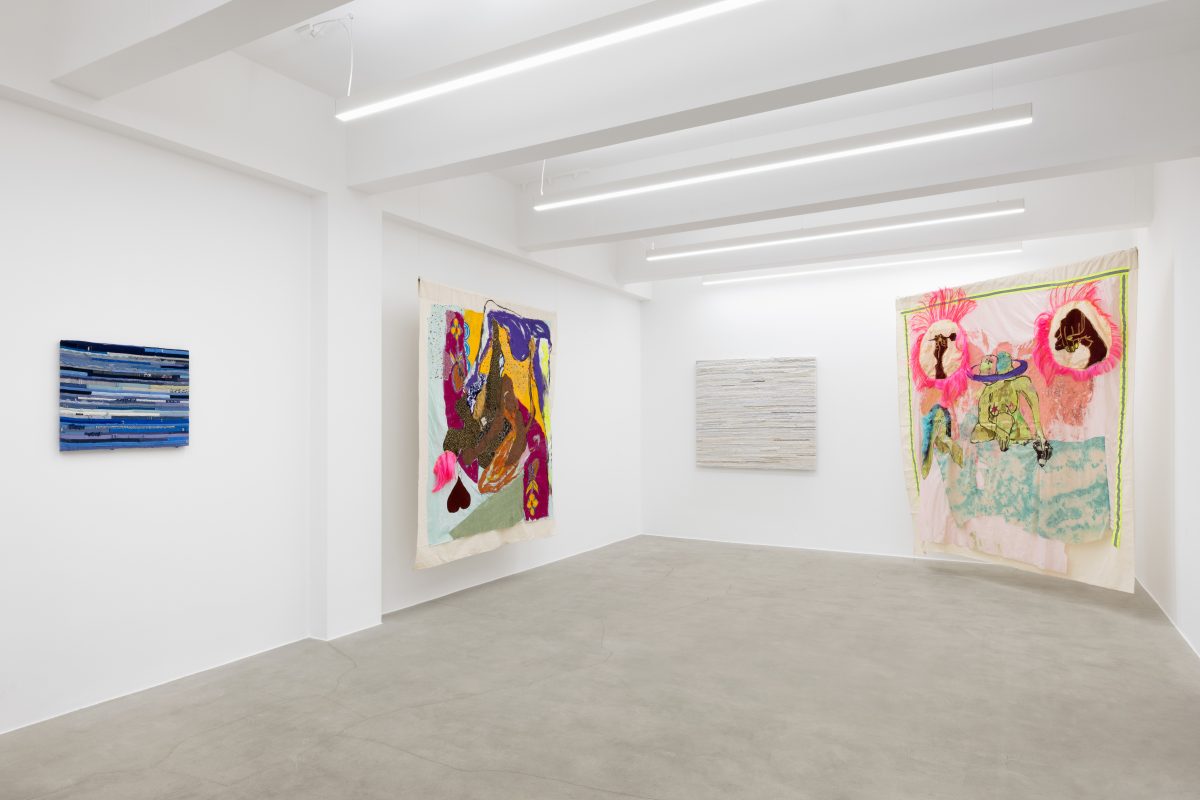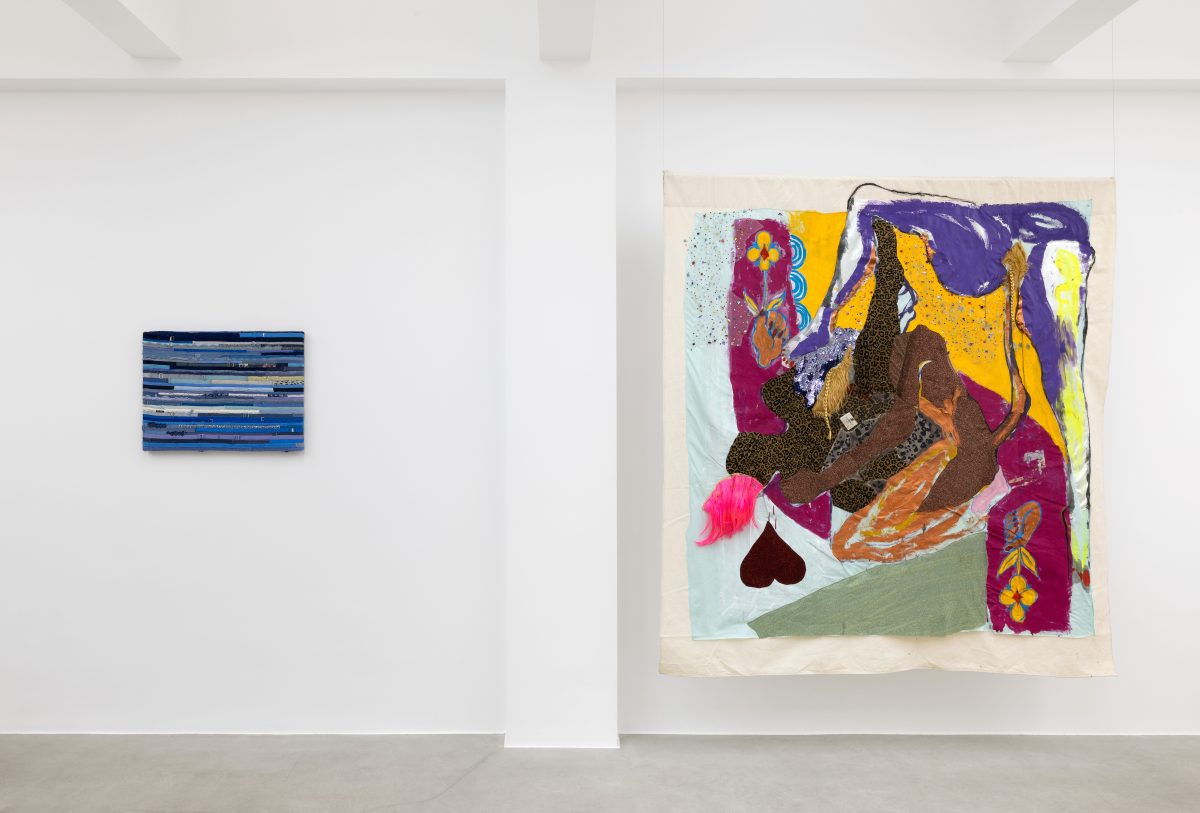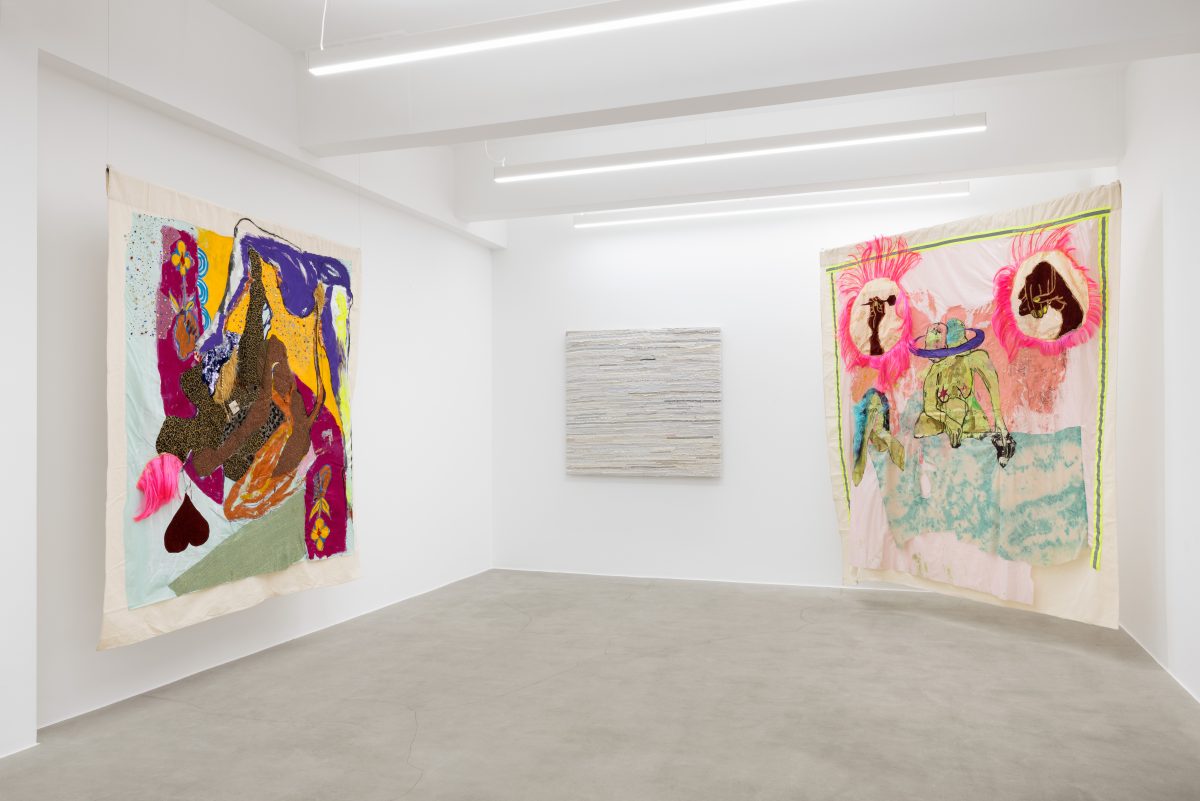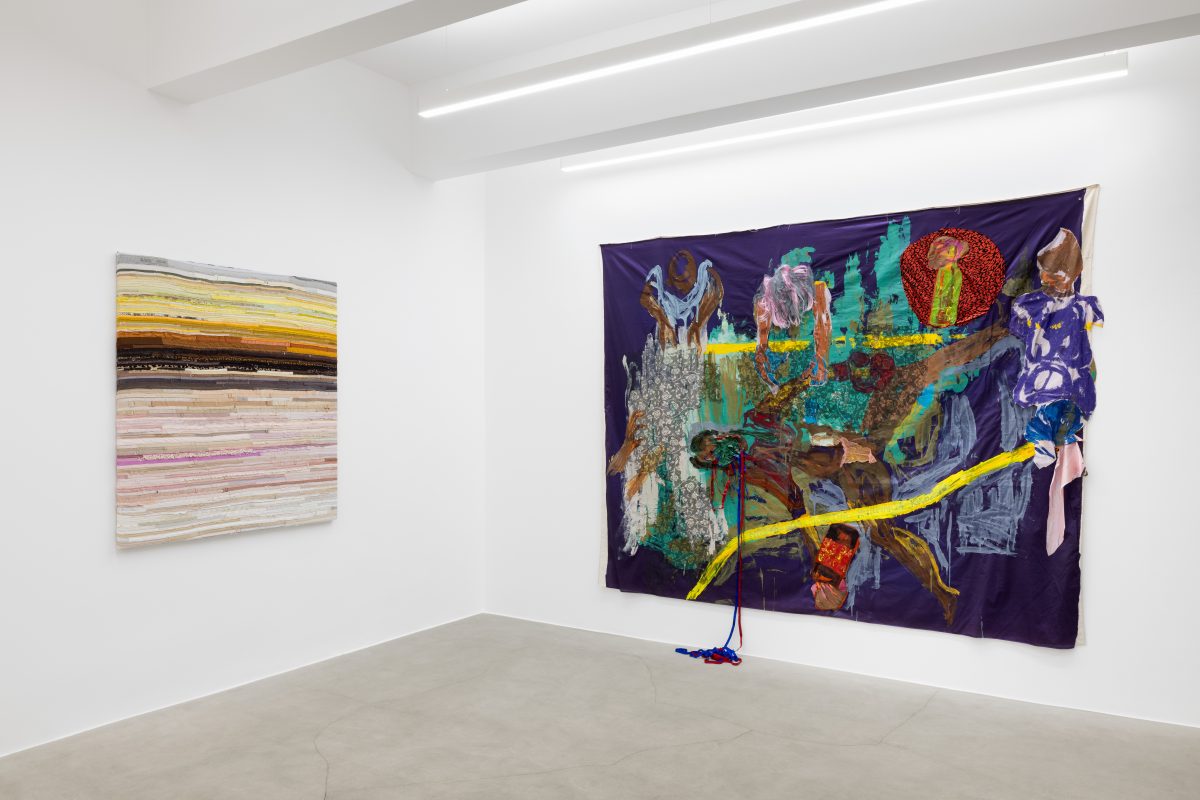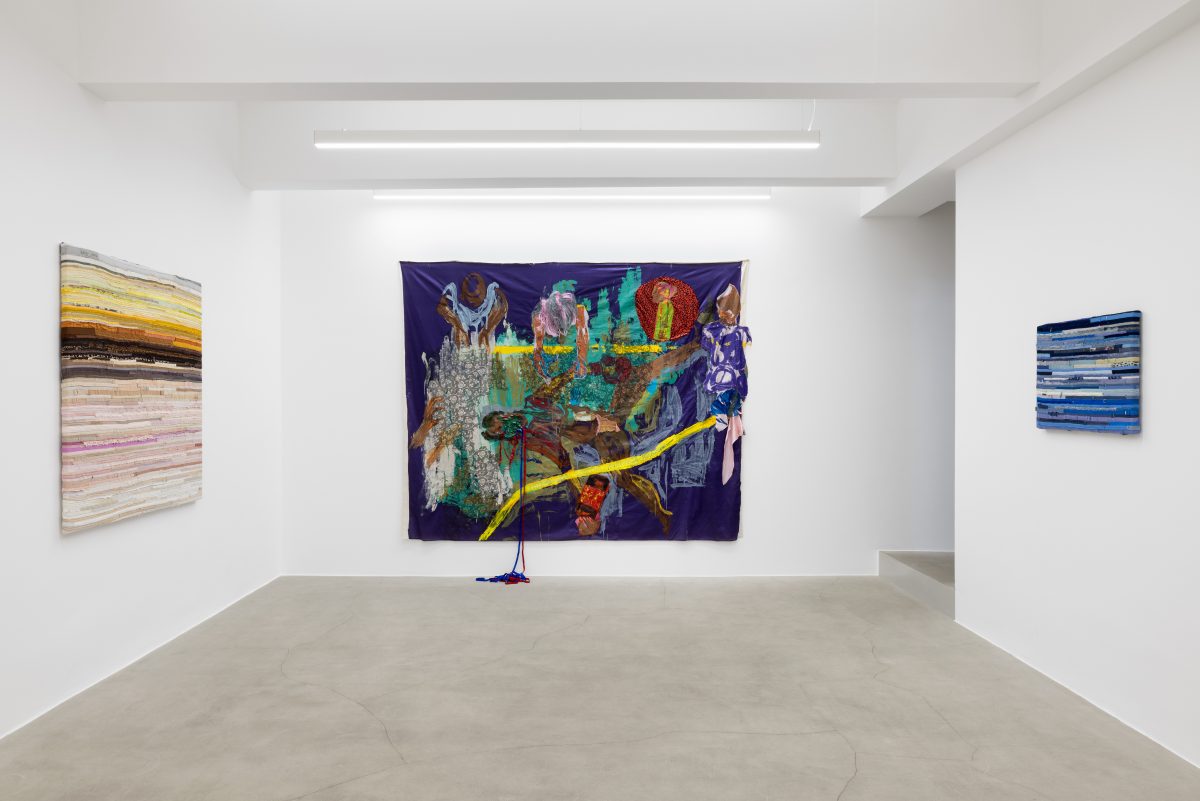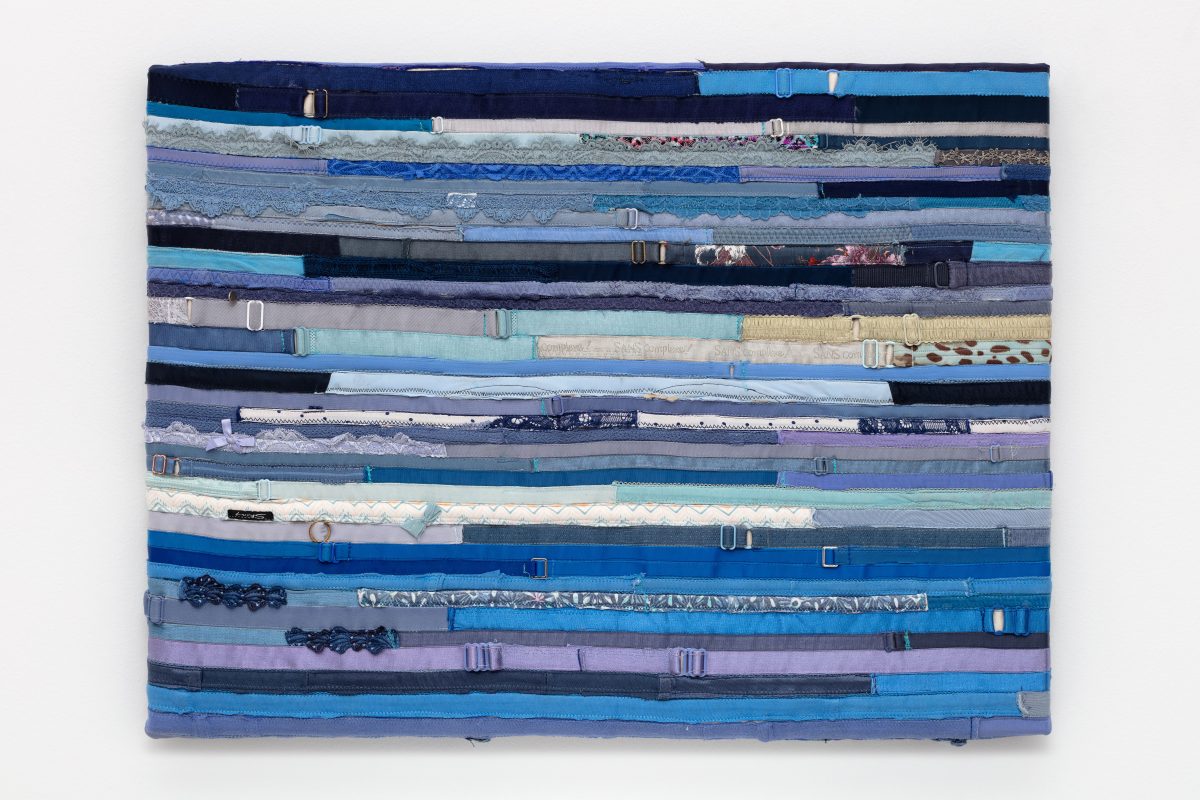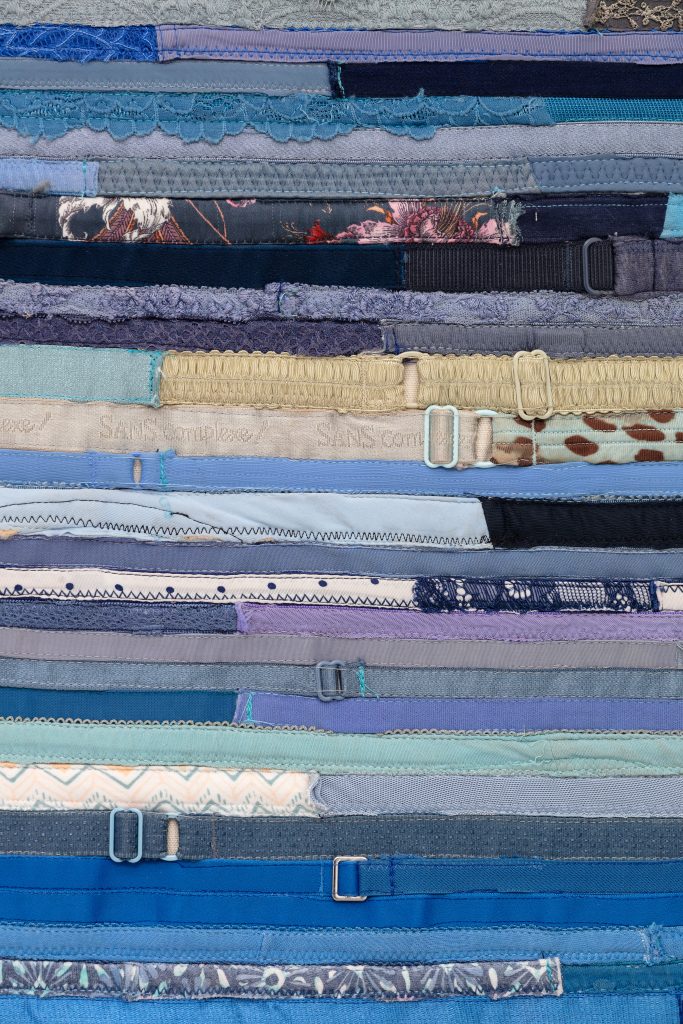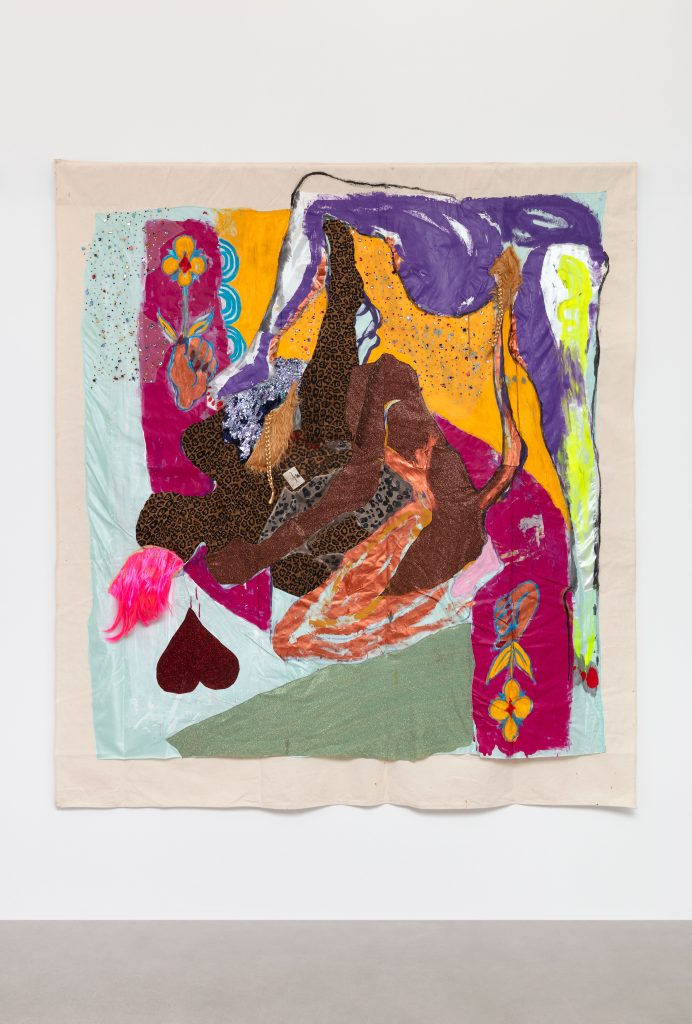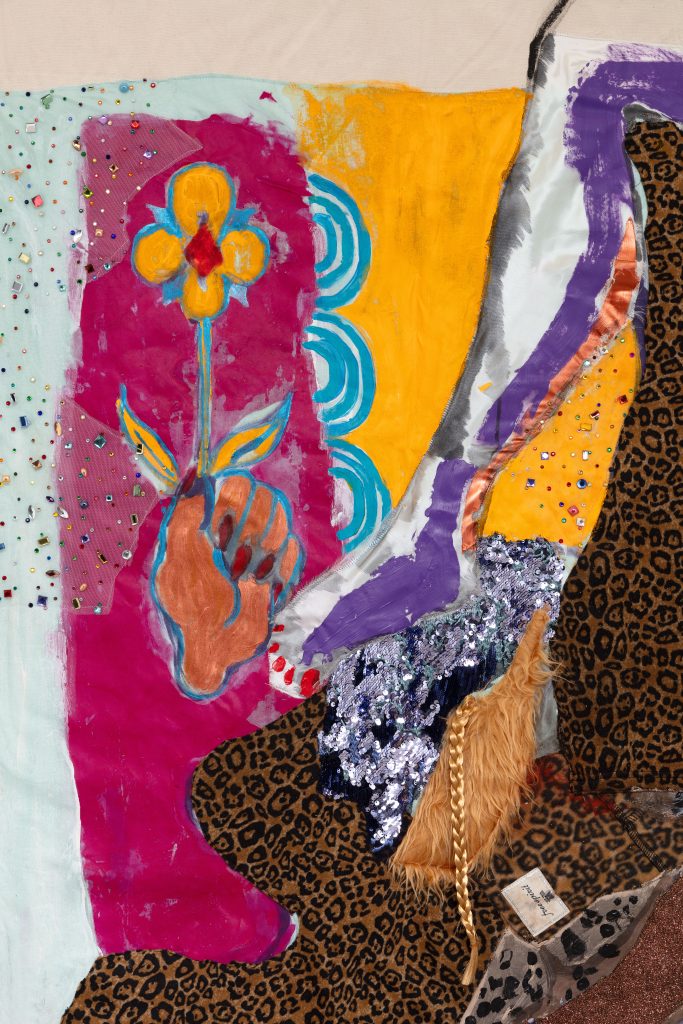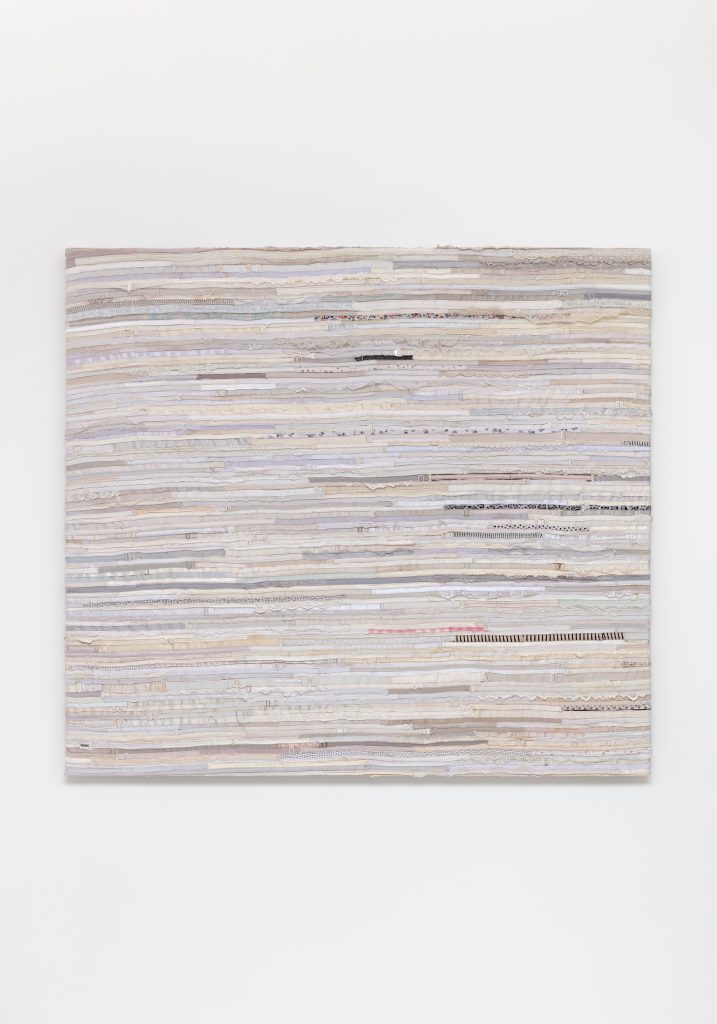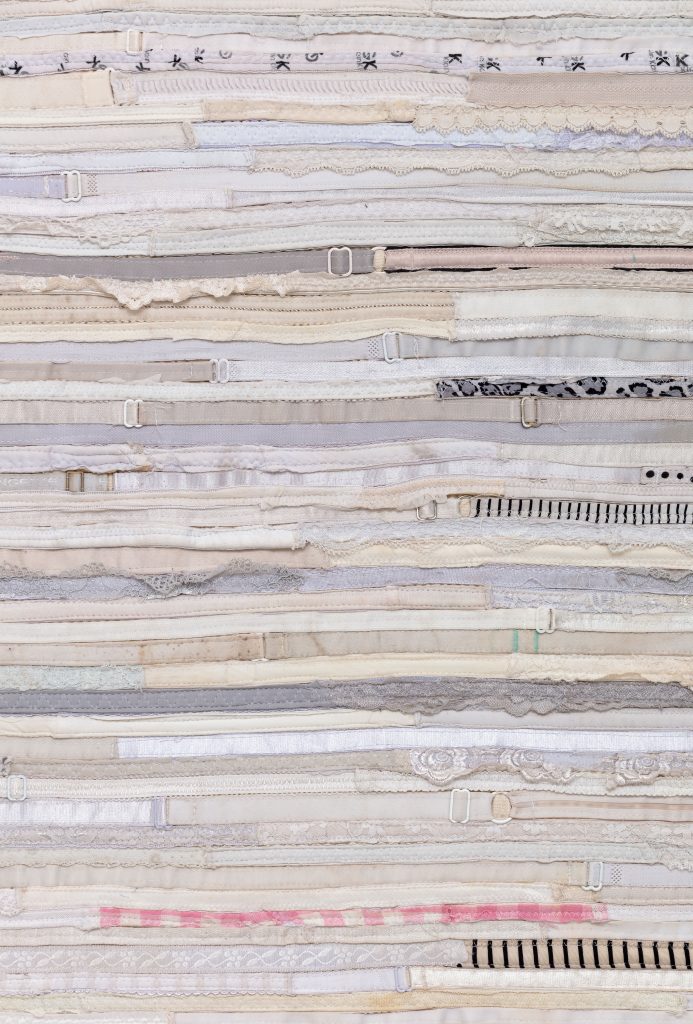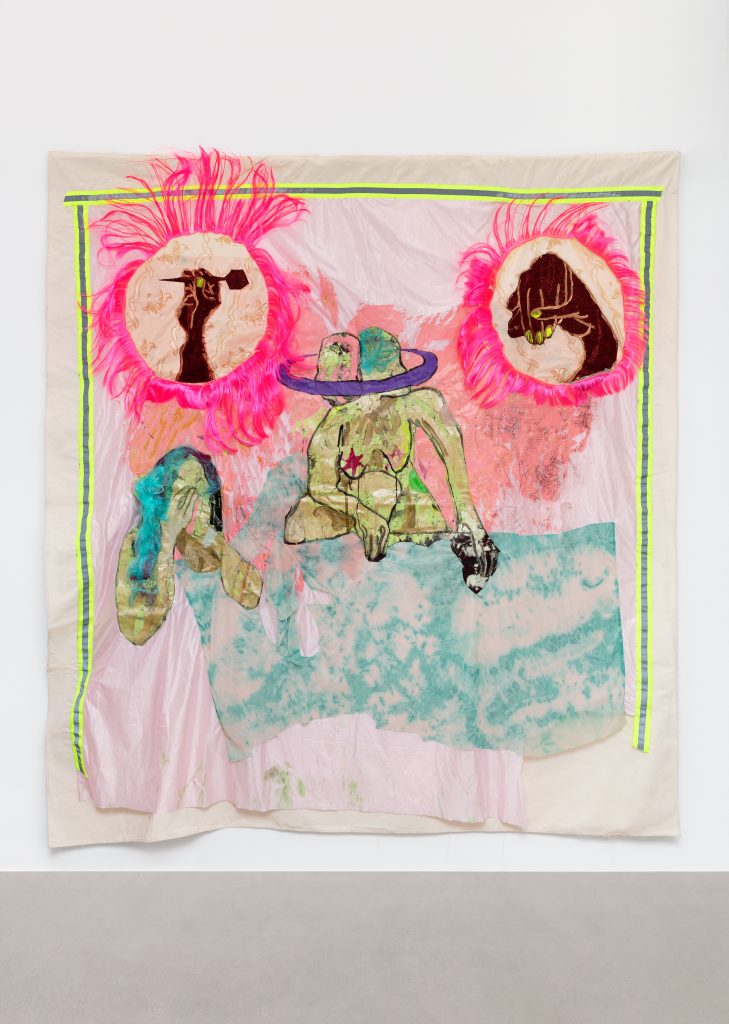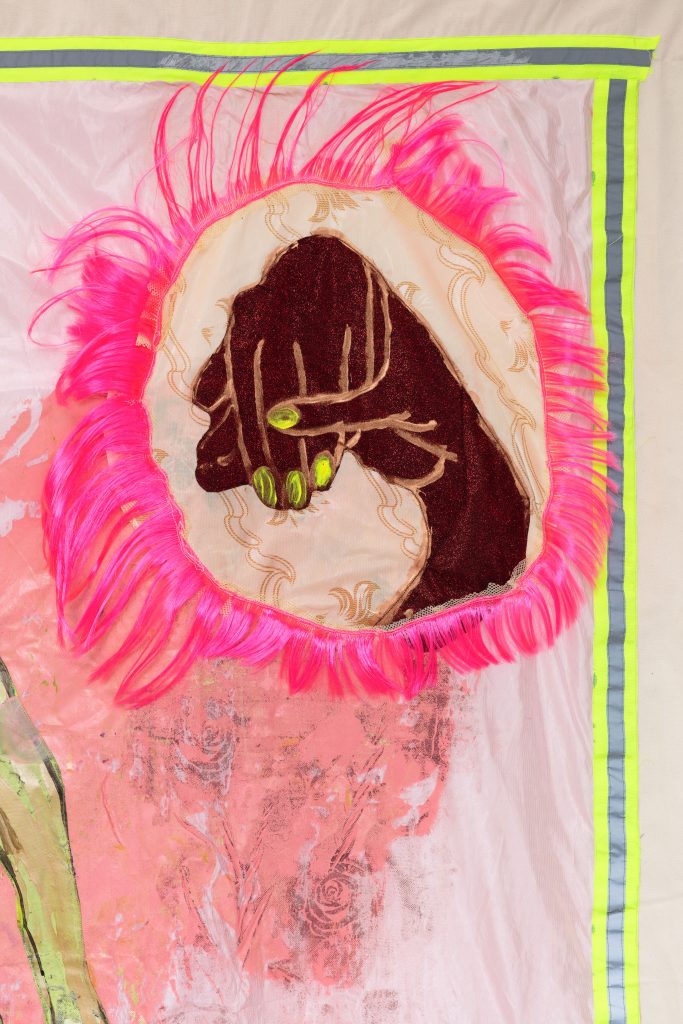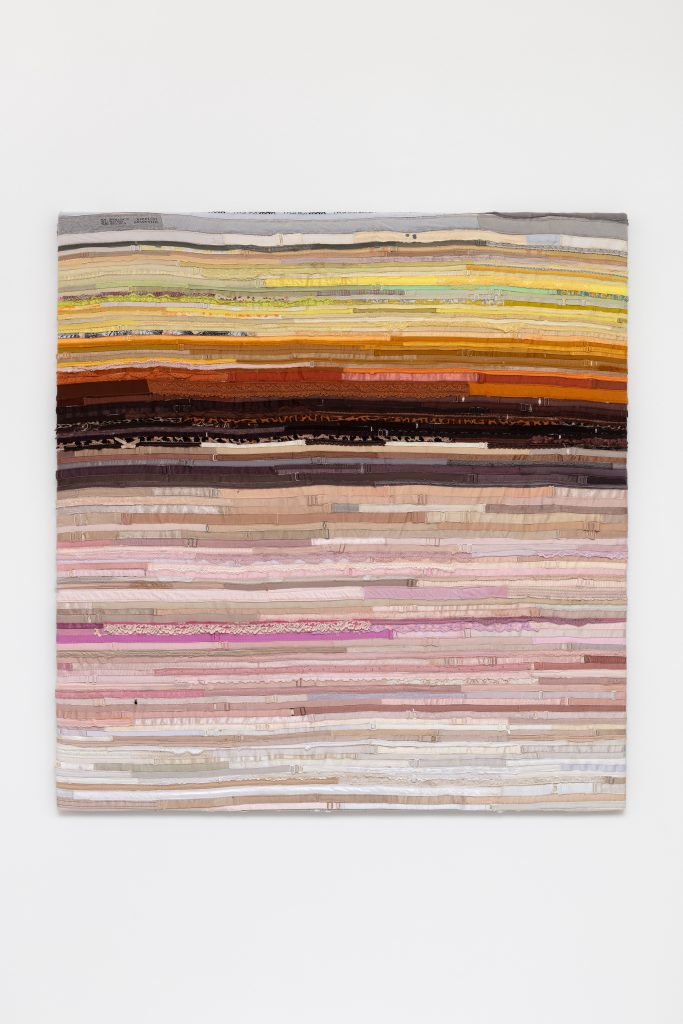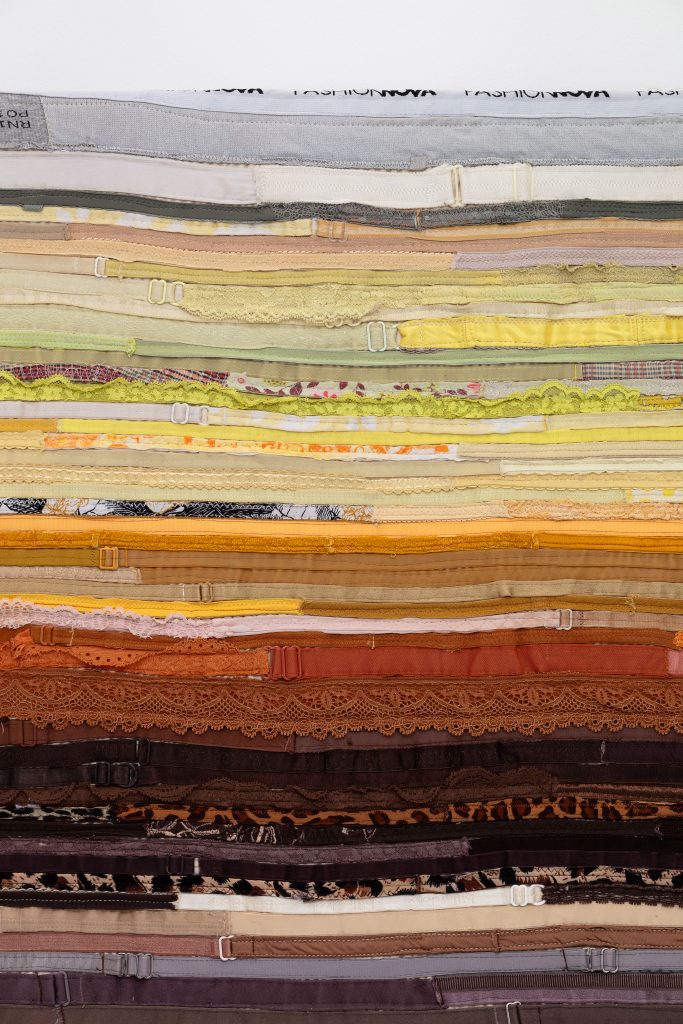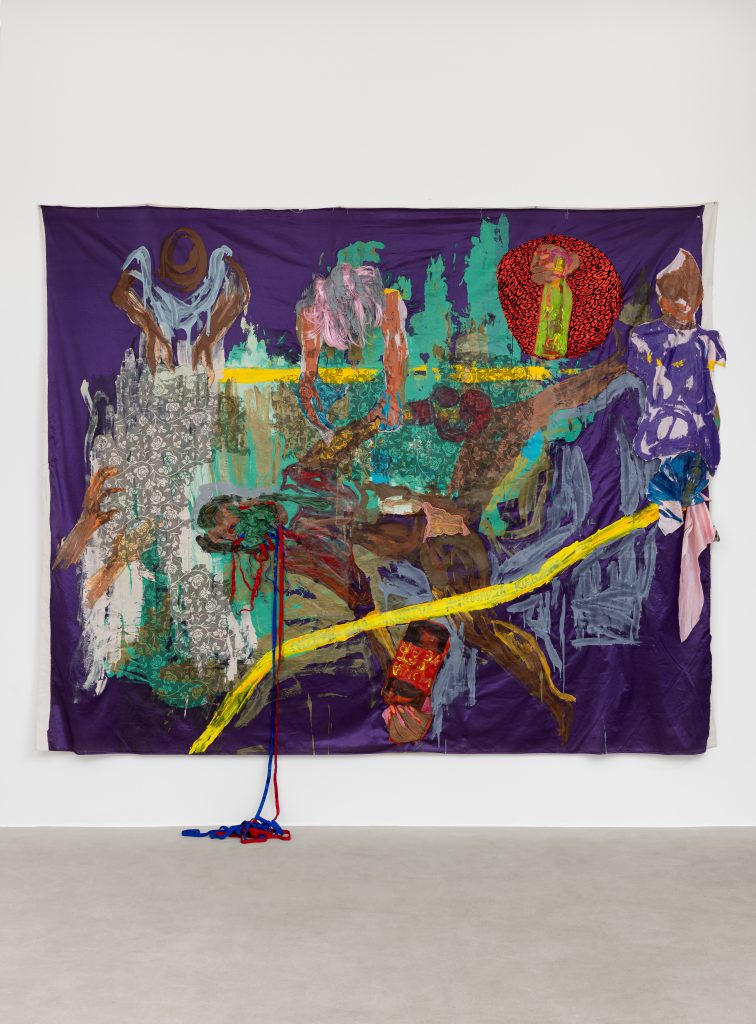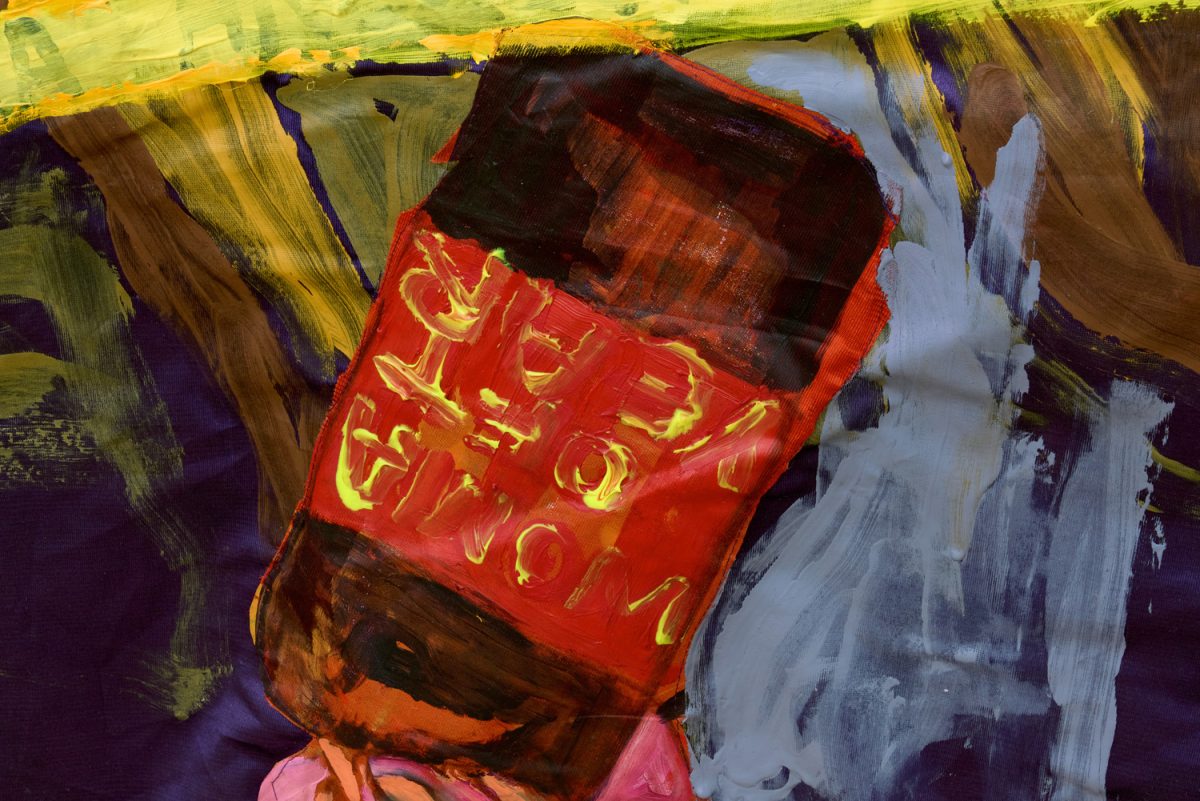
- This event has passed.
kaufmann repetto is pleased to announce Kresiah Mukwazhi’s first solo exhibition at the gallery, opening concurrently in Milan and New York, presenting two new bodies of work titled Ndakangavara and Nyika irikure nezuva. Her latest production stems from the artist’s research exploring themes of gender, exploitation, and colonialism, with a particular focus on the power of the patriarchal gaze and the woman’s body in contemporary Africa.
Mukwazhi’s engagement with marginalized communities, particularly femme sex workers in Harare, Zimbabwe, informs much of her work. For the past decade, she’s addressed issues of gender-based violence while simultaneously channeling and celebrating feminine energy to reclaim women’s rights and sexual freedom.
The exhibition in Milan titled Ndakangavara – a Shona expression which translates to “I am glowing” – is inspired by the complexities of identity and the concept of transformation, with a particular focus on how women navigate societal expectations in a world that often misjudges them. Quite a common phrase amongst women in Mukwazhi’s immediate society, Ndakangavara is used to describe a life changing for the better, “to experience positive change” as the artist puts it, but has become increasingly more associated to the practice of skin bleaching and its damaging effects. The “glow” has recently evolved from a spiritual and metaphysical enlightenment, to a literal whitening of the body, in an attempt to adapt to non-black conventional beauty standards. For decades, the import of the Global North’s ways and lifestyle has harmed the struggle for self-empowerment that women have to face in African culture, on top of the pressures already deeply rooted within its male-dominated community.
Fostered by patriarchal cultures, traditions, and belief systems, social control over women’s bodies extends to expectations regarding behavior and dress codes. In Zimbabwe, the display of women’s underwear holds significant meaning, usually considered controversial or even taboo when worn in a revealing manner – the wearer is judged based on concepts of purity and eligibility. Mukwazhi faces this misogynistic narrative by engaging directly with these culturally charged objects. She works with hundreds of secondhand used bras sourced from charity donations, often smuggled to be resold illegally within her own country, carefully deconstructing each piece before stitching and stretching the straps over frames. The resulting artwork reflects the many women whose bodies have worn these garments, carrying the traces of their past owners—both physically and energetically – also serving as a tribute to the countless women who have lost their lives to violence.
For Mukwazhi, however, Ndakangavara is a body of work created to highlight the unexpected beauty found in what would otherwise be unfortunate realities, re-defining and re-appropriating the word, tracing it back to the original meaning of positive change, expanding it to an anti-capitalist, anti-colonial and anti-patriarchal perspective. Throughout her life, Kresiah Mukwazhi has consistently fought to break the taboos that hang over the people of her homeland, through videos, performances and paintings, with an enormous bravery and commitment. This effort is conveyed in the authentic form of Mukwazhi’s art, materialising her personal experiences in her work. Her large textile collages like Unsupervised and Nyika yenyama nemweya (The Universe of Flesh and Spirit) are created from scavenged materials found in local flea markets and second hand stores, piecing together typically feminine apparel and lingerie: cheap, synthetic, brightly coloured fabrics, often printed with tiger and leopard patterns, or trimmed with lace and tinsel. It’s the garments one would encounter in Harare’s bars and streets, carrying the intimate lives of the women who wore them, telling the stories of women mercilessly exposed to the sex trade without any protection or rules since early age, yet still finding a way and reason to “glow” through their own resilience.
The female body itself thus becomes both a haunting curse that bears the scars of abuse and exploitation, and a powerful blessing towards emancipation and self-determination once its energy and sexuality are embraced. Mukwazhi chooses to acknowledge the former, but especially focuses on the latter. The women portrayed in her canvases lay in daring poses, at times naked, intertwined in acts of soft erotism, or wearing instruments for battle like the boxing glove in The unrest of Movado. All of her works ultimately carry a spontaneously positive spirit, upholding the female body – her own, first and foremost – as a site for resistance and as the host for a sacred power that women are destined to wield.
Kresiah Mukwazhi was born in 1992 in Harare, Zimbabwe, where she currently lives and works. She has been the subject of international exhibitions and biennials, including: Nottingham Contemporary (2023); Secession, Vienna (2023); Zimbabwean Pavilion, 59th Venice Biennial (2022); Kunstmuseum Wolfsburg (2022); South African National Gallery, Cape Town (2020); Zeitz Museum of Contemporary Art Africa (MOCAA), Cape Town (2019); SAVVY Contemporary, Berlin (2017); The National Gallery of Zimbabwe, Bulawayo (2016), among others. Her monumental bra strap mural is currently shown at Museum Ludwig, Cologne, as part of the fourth iteration of the Schultze Projects curated by Yilmaz Dziewior.
kaufmann repetto è lieta di presentare la prima mostra personale di Kresiah Mukwazhi nelle due sedi della galleria a Milano e New York. I due nuovi corpi di lavoro intitolati Ndakangavara e Nyika irikure nezuva, nati dalla ricerca dell’artista sui temi di genere, sfruttamento e colonialismo, si focalizzano particolarmente sul potere dello sguardo patriarcale e sul corpo femminile nell’Africa contemporanea.
Il lavoro di Mukwazhi è fortemente influenzato dal suo impegno con le comunità marginalizzate, in particolare con le lavoratrici del sesso di Harare, in Zimbabwe. Negli ultimi dieci anni, l’artista ha affrontato il tema della violenza di genere, celebrando al contempo la femminilità come energia per rivendicare i diritti delle donne e la libertà sessuale.
La mostra di Milano prende il nome da un’espressione Shona, Ndakangavara (che significa “sto brillando”) ed esplora le complessità dell’identità e del progresso, con attenzione al modo in cui le donne affrontano le aspettative sociali in un mondo che spesso le giudica. Ndakangavara è una frase comune tra le donne vicine a Mukwazhi, ed è usata per descrivere un cambiamento positivo, un miglioramento della vita. Tuttavia, questa espressione è diventata sempre più legata alla pratica del skin bleaching (lo sbiancamento della pelle) e ai suoi effetti dannosi. In questo contesto, il “brillare” è passato dall’essere un’illuminazione spirituale e metafisica a un tentativo di sbiancamento del corpo per adattarsi agli standard di bellezza convenzionali importati. Dunque i valori e gli stili di vita dell’Occidente hanno ulteriormente danneggiato la lotta per l’autosufficienza delle donne in Africa, già messa a dura prova da una società dominata dagli uomini.
La cultura patriarcale, le tradizioni e i sistemi di credenze popolari hanno imposto un controllo sociale sui corpi delle donne, estendendosi anche al comportamento e al codice di abbigliamento. In Zimbabwe, l’esposizione della biancheria intima femminile è considerata un tabù, soprattutto quando è indossata in modo rivelatore. Mukwazhi affronta questa narrazione misogina lavorando direttamente con questi oggetti carichi di significato. Utilizzando centinaia di reggiseni di seconda mano, spesso provenienti da donazioni benefiche e contrabbandati per essere rivenduti illegalmente nel suo paese, l’artista decostruisce ogni pezzo prima di cucirlo e distenderlo su telai. Il risultato è un’opera che riflette l’intimità delle molte donne che hanno indossato questi indumenti, portando con sé i segni fisici ed energetici delle loro passate proprietarie, e che diventa un tributo a tutte le donne che hanno perso la vita a causa della violenza.
Per Mukwazhi, Ndakangavara è una serie che celebra la bellezza inaspettata che può emergere dalle realtà più difficili, riappropriandosi della parola per tornare al suo significato originale di cambiamento positivo. L’artista espande questo concetto a una visione anti-capitalista, anti-coloniale e anti-patriarcale. Nel corso della sua carriera, Kresiah Mukwazhi ha lottato per spezzare i tabù che incombono sulla sua terra attraverso video, performance e pittura, dimostrando enorme coraggio e impegno. Le sue opere, come i grandi collages tessili Unsupervised e Nyika yenyama nemweya (L’Universo della Carne e dello Spirito), sono realizzate con materiali recuperati dai mercatini delle pulci e dai negozi di seconda mano, assemblando abiti e lingerie femminili: tessuti economici, sintetici, dai colori vivaci, spesso decorati con motivi di tigrati e leopardati o rifiniti con pizzo. Questi abiti vengono dai bar notturni e dai i vicoli di Harare, portando con sé le storie intime delle persone che li hanno indossati, raccontando le esperienze di donne calate nel mercato del sesso senza alcuna protezione, ma che, nonostante tutto, riescono a “brillare” grazie alla loro resilienza.
Il corpo femminile diventa, quindi, sia una condanna che porta con sé le cicatrici di abusi e sfruttamento, ma anche e soprattutto una potente benedizione che conduce verso l’emancipazione e l’autodeterminazione, una volta che la sua energia e sessualità vengono accettate. Mukwazhi riconosce questo doppio aspetto, ma si concentra soprattutto sulla forza trasformativa dell’energia femminile. Le donne ritratte nelle sue opere si trovano in pose audaci, a volte nude, intrecciate in atti di erotismo soft, o indossando strumenti di battaglia come i guanti da boxe, come inThe Unrest of Movado. Ogni sua opera trasmette uno spirito spontaneamente positivo, esaltando il corpo femminile – il proprio, innanzitutto – come un luogo di resistenza e come portatore di un potere sacro che le donne sono destinate a esercitare.
Kresiah Mukwazhi è nata nel 1992 a Harare, Zimbabwe, dove attualmente vive e lavora. È stata soggetto di diverse mostre internazionali, tra cui: Nottingham Contemporary (2023); Secession, Vienna (2023); Padiglione dello Zimbabwe, 59ª Biennale di Venezia (2022); Kunstmuseum Wolfsburg (2022); South African National Gallery, Città del Capo (2020); Zeitz Museum of Contemporary Art Africa (MOCAA), Città del Capo (2019); SAVVY Contemporary, Berlino (2017); The National Gallery of Zimbabwe, Bulawayo (2016). Kresiah Mukwazhi è attualmente esposta al Museum Ludwig di Colonia, in occasione della quarta edizione di Schultze Projects, curato da Yilmaz Dziewior.

